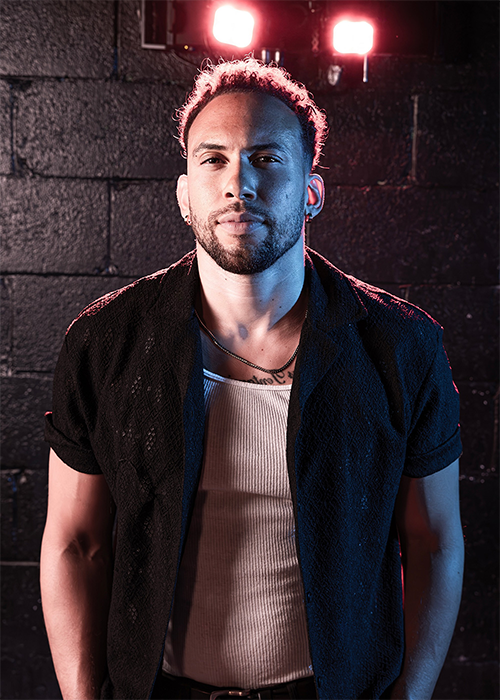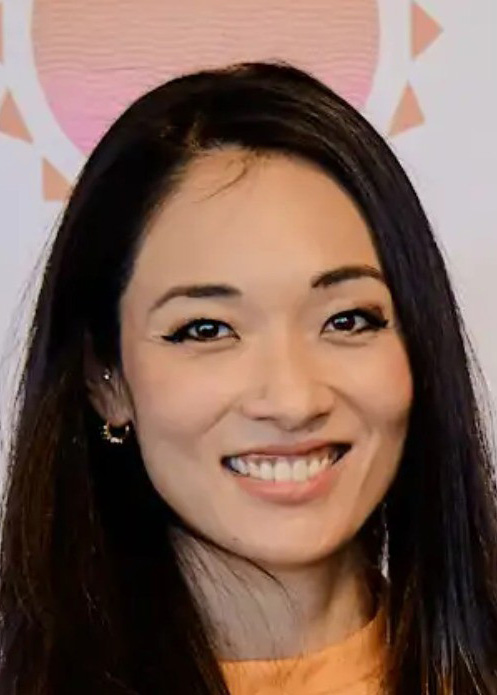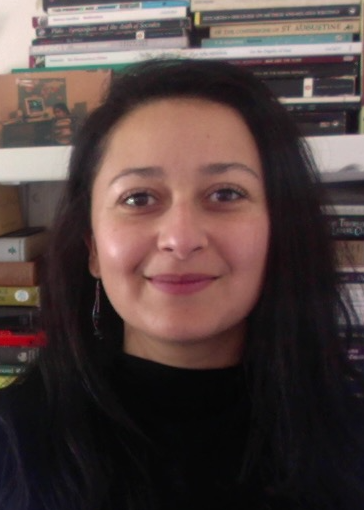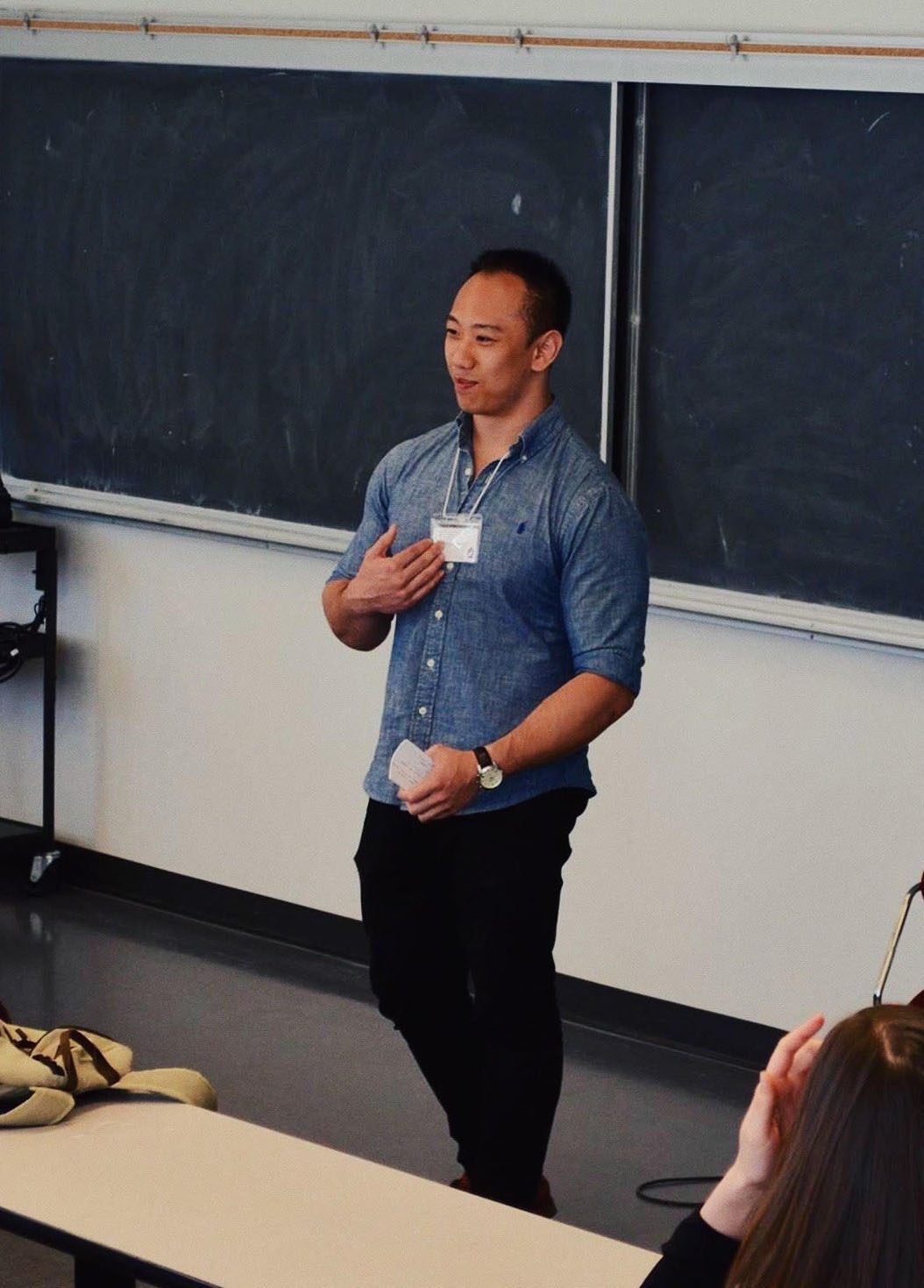Syed Faiz Jaffar
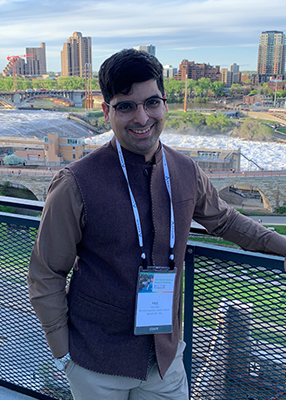
Why did you choose your program at UBC and what did you enjoy most about it?
Before coming to UBC I always had an interest in language learning, and so the first course I ever picked was UBC Chinese (Intensive).
At the start of my second year, before realizing it, I had almost 16 credits of language learning. That’s when I realized I should pick a program that put all that time and effort into use. Both Asian Studies (Chinese) and International Relations had high language requirements, and so I decided to pursue both.
What I enjoyed about both programs was walking into the office of a professor on a slow day and just talking about books, or historical precedent, or a number of other nerdy things.
What were some of your most meaningful experiences at UBC?
The annual Chinese Bridge Mandarin Speech contest. Every university and college in the lower mainland would participate in four categories. It was the best use of a Saturday every year.
I remember in my first year participating in the beginner group and slowly moving up. In my 4th year, I made it to the advanced category, and I came in last (also known as second). Of course I wasn’t going to stop at second place, so I fine tuned my tones and pronunciation with my instructors, and came in first place that year. That gave me the confidence to apply for law school in China. Everything else that happened in my career came from that victory, and that victory started with a sheepish first-year boy who just wanted to try his best in a local Mandarin contest.
What choices did you make at UBC that contributed to your career success / journey?
I had certain passions before entering UBC (History, Mandarin, Reading, etc.). I decided early on that my passion for learning was not going to support my studies in university, but rather university would support my passion for learning. In other words, I would continue to learn on my free time. My courses and profs would never have a monopoly on my education.
I know classmates who studied Japanese/Chinese for four years, but only in the classroom. They did not have the language skills or knowledge base to survive in the workforce. Same with economics, public policy, you name it. Too many people don’t realize most of the learning happened outside the classroom.
What was your first job after graduation and what other jobs did you have before your current position?
I worked in a law firm in Beijing, China as a legal intern. My job was to review bilingual documents (English-Chinese) to make sure they matched up. It was meticulous and laborious work, but it built a skillset which I took with me in everything else.
Shortly after I worked in:
- Legal Counsel for a Chinese SOE
- Legal Translator for a Chinese IP firm
- Legal and Policy researcher at a Management Consulting firm
Now, my current position is a Member Services Manager at a professional trade association.
Is your current career path as you originally intended? What challenges did you face in launching your career?
Intend? What makes you think I intended anything?
I think when I started my programs there were very predetermined career paths people think exist. Asian Language majors become translators, and IR students become diplomats. That was the common wisdom at the time and I was sure I would end up in one of those roles. I’ve always been bored of translation, and my friends have described me as “aggressively undiplomatic.”
Obviously this was a significant challenge.
But I think launching a successful career is not about what it says on a degree, but finding what’s written between the lines.
IR meant I could read dense and jargon-filled texts. Asian Studies meant I had to be able to explain things in different languages, to very different demographics. I quickly made a career not as a translating diplomat (God forbid), but as the guy who could read articles/contracts/policies/Dan-Brown-novels, and lay it out in plain language(s) and in way that Chinese investors, Japanese accountants, and Indian board members could follow.
What do you like about your current job and what do you find challenging? How does it relate to your degree?
I came into university with a passion for learning that I refused to let the post-secondary school system suck out of me. I came out of university proud that I could still read non-fiction without hyperventilating, sparingly rare for double-major students.
What I love about my job is two things, but is really one thing. I still get to learn, just as much as I did in university. We are an international organization with work in every major industry, and so there is no shortage of knowledge.
The second thing, which is really the first, is I finally get to use my language ability. I use French with our European business, Chinese/Japanese with East Asia and Urdu/Hindi in South Asia. I learned six languages, and I get to use all of them, and how cool is that? Where else can you do that?
I think back to those Friday nights when my parents told me to stop reading about Sino-Tibetan linguistics and to do something useful like go to a party or something. Showed you, mom and dad.
From your experience, what has been the value of having an Arts degree?
The value is that it’s a “do whatever you want degree” or a “one of everything degree” which when you’re both indecisive and avaricious is really quite nice. My first legal project was in the entertainment industry, the second was chemical manufacturing. Then I switched to consulting where I had to read public policy on insurance. Two years ago there was a hard shift into aviation, and I had to learn how airplanes are repaired and recycled in China. Finally, I got into my current role which is largely based in finance and accounting.
I have friends who completed engineering and now struggle to make the hard shift into a different industry and profession. For me, because of my Arts degree, the shift from chemistry, to aviation, and to finance wasn’t that bad.
What advice would you give to students and alumni interested in breaking into your industry?
Learn stuff, and be curious. Learn stuff that isn’t related to your industry, or your major, or your work. I majored in Chinese and then decided to learn French. Is that related to work in China? Not really. That is until the Canadian Embassy desperately needed help, and then suddenly that became very useful. I learned Python while pursuing a career in international finance. I had no idea if I would even use it. Then the European Union released the EU GDPR, a monster of a data protection regime that made even the Chinese Communist Party feel inadequate. Now having a basic knowledge of data storage and protection was the price of entry to business in Europe. Our competition was still scrambling to catch up.
If you’re interested in it, learn it. Don’t restrict yourself to your major, or try to figure out how something will be relevant. I don’t care if you want to go to law school or study German literature, learn Spanish and microbiology. You never know if there is going to be a global pandemic.
What advice would you give to your first-year self?
Don’t obsess about what you want to do with your life, because honestly you don’t really know. Don’t make decisions based on what lands the “safest” job, or meet arbitrary standards set up by parents and the hypothetical family you don’t have. Ten years on from my first year, I would have saved so much stress if I wasn’t trying to meet life goals that feel like someone else decided for me. I’d tell the younger me that I’m still learning Chinese, still taking courses, and I’m still updating my CV. I found happiness in the journey, and now I hope there is no finish line.
Syed Faiz Jaffar



Why did you choose your program at UBC and what did you enjoy most about it?
Before coming to UBC I always had an interest in language learning, and so the first course I ever picked was UBC Chinese (Intensive).
At the start of my second year, before realizing it, I had almost 16 credits of language learning. That’s when I realized I should pick a program that put all that time and effort into use. Both Asian Studies (Chinese) and International Relations had high language requirements, and so I decided to pursue both.
What I enjoyed about both programs was walking into the office of a professor on a slow day and just talking about books, or historical precedent, or a number of other nerdy things.
What were some of your most meaningful experiences at UBC?
The annual Chinese Bridge Mandarin Speech contest. Every university and college in the lower mainland would participate in four categories. It was the best use of a Saturday every year.
I remember in my first year participating in the beginner group and slowly moving up. In my 4th year, I made it to the advanced category, and I came in last (also known as second). Of course I wasn’t going to stop at second place, so I fine tuned my tones and pronunciation with my instructors, and came in first place that year. That gave me the confidence to apply for law school in China. Everything else that happened in my career came from that victory, and that victory started with a sheepish first-year boy who just wanted to try his best in a local Mandarin contest.
What choices did you make at UBC that contributed to your career success / journey?
I had certain passions before entering UBC (History, Mandarin, Reading, etc.). I decided early on that my passion for learning was not going to support my studies in university, but rather university would support my passion for learning. In other words, I would continue to learn on my free time. My courses and profs would never have a monopoly on my education.
I know classmates who studied Japanese/Chinese for four years, but only in the classroom. They did not have the language skills or knowledge base to survive in the workforce. Same with economics, public policy, you name it. Too many people don’t realize most of the learning happened outside the classroom.
What was your first job after graduation and what other jobs did you have before your current position?
I worked in a law firm in Beijing, China as a legal intern. My job was to review bilingual documents (English-Chinese) to make sure they matched up. It was meticulous and laborious work, but it built a skillset which I took with me in everything else.
Shortly after I worked in:
- Legal Counsel for a Chinese SOE
- Legal Translator for a Chinese IP firm
- Legal and Policy researcher at a Management Consulting firm
Now, my current position is a Member Services Manager at a professional trade association.
Is your current career path as you originally intended? What challenges did you face in launching your career?
Intend? What makes you think I intended anything?
I think when I started my programs there were very predetermined career paths people think exist. Asian Language majors become translators, and IR students become diplomats. That was the common wisdom at the time and I was sure I would end up in one of those roles. I’ve always been bored of translation, and my friends have described me as “aggressively undiplomatic.”
Obviously this was a significant challenge.
But I think launching a successful career is not about what it says on a degree, but finding what’s written between the lines.
IR meant I could read dense and jargon-filled texts. Asian Studies meant I had to be able to explain things in different languages, to very different demographics. I quickly made a career not as a translating diplomat (God forbid), but as the guy who could read articles/contracts/policies/Dan-Brown-novels, and lay it out in plain language(s) and in way that Chinese investors, Japanese accountants, and Indian board members could follow.
What do you like about your current job and what do you find challenging? How does it relate to your degree?
I came into university with a passion for learning that I refused to let the post-secondary school system suck out of me. I came out of university proud that I could still read non-fiction without hyperventilating, sparingly rare for double-major students.
What I love about my job is two things, but is really one thing. I still get to learn, just as much as I did in university. We are an international organization with work in every major industry, and so there is no shortage of knowledge.
The second thing, which is really the first, is I finally get to use my language ability. I use French with our European business, Chinese/Japanese with East Asia and Urdu/Hindi in South Asia. I learned six languages, and I get to use all of them, and how cool is that? Where else can you do that?
I think back to those Friday nights when my parents told me to stop reading about Sino-Tibetan linguistics and to do something useful like go to a party or something. Showed you, mom and dad.
From your experience, what has been the value of having an Arts degree?
The value is that it’s a “do whatever you want degree” or a “one of everything degree” which when you’re both indecisive and avaricious is really quite nice. My first legal project was in the entertainment industry, the second was chemical manufacturing. Then I switched to consulting where I had to read public policy on insurance. Two years ago there was a hard shift into aviation, and I had to learn how airplanes are repaired and recycled in China. Finally, I got into my current role which is largely based in finance and accounting.
I have friends who completed engineering and now struggle to make the hard shift into a different industry and profession. For me, because of my Arts degree, the shift from chemistry, to aviation, and to finance wasn’t that bad.
What advice would you give to students and alumni interested in breaking into your industry?
Learn stuff, and be curious. Learn stuff that isn’t related to your industry, or your major, or your work. I majored in Chinese and then decided to learn French. Is that related to work in China? Not really. That is until the Canadian Embassy desperately needed help, and then suddenly that became very useful. I learned Python while pursuing a career in international finance. I had no idea if I would even use it. Then the European Union released the EU GDPR, a monster of a data protection regime that made even the Chinese Communist Party feel inadequate. Now having a basic knowledge of data storage and protection was the price of entry to business in Europe. Our competition was still scrambling to catch up.
If you’re interested in it, learn it. Don’t restrict yourself to your major, or try to figure out how something will be relevant. I don’t care if you want to go to law school or study German literature, learn Spanish and microbiology. You never know if there is going to be a global pandemic.
What advice would you give to your first-year self?
Don’t obsess about what you want to do with your life, because honestly you don’t really know. Don’t make decisions based on what lands the “safest” job, or meet arbitrary standards set up by parents and the hypothetical family you don’t have. Ten years on from my first year, I would have saved so much stress if I wasn’t trying to meet life goals that feel like someone else decided for me. I’d tell the younger me that I’m still learning Chinese, still taking courses, and I’m still updating my CV. I found happiness in the journey, and now I hope there is no finish line.
